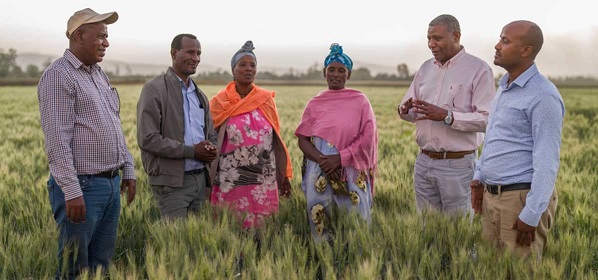
Sudanese wheat growers like Daf’Allah Mohamed Ahmed have battled the elements in recent years. Droughts, rising temperatures and the coronavirus pandemic have stretched the country’s agricultural sector, and smallholder farmers need a helping hand.
The African Development Bank’s programme, Technologies for African Agricultural Transformation, provided the answer. The program helped Ahmed and millions of other farmers in some African countries access better seeds and technical training. They received the much need support to boost yields and raise incomes.
Ahmed’s new heat-tolerant wheat variety grows better in Sudan’s rising temperatures, which often exceed 30°C. He has been able to double his yield to 5 tons. He praised the scheme for churning out a harvest of “good-quality wheat in record quantities…My wheat yield increased from 2.5 tons to 5 tons.”
Promoting new seed technology is just one of the ways the African Development Bank is increasing yields across the continent under its Feed Africa campaign. Governments are increasingly relying less on imports and spending less on subsidies, while keeping grocery prices down.
Overall, the Technologies for African Agricultural Transformation program is doubling the productivity of maize, rice, wheat and six other vital commodities. By November 2020, 10.6 million farmers had already benefited from the initiative. The Bank is on track to meet its target of reaching 40 million farmers by 2025, according to its 2021 Annual Development Effectiveness Review.
The flagship study evaluates the Bank’s contribution to Africa’s development. It reviews the institution’s performance in relation to achieving its “High 5” goals, focusing on generation and distribution of energy, industrialization, cross-border integration, agriculture and raising living standards.
The report notes that around 397 million people on the African continent were pushed into hunger and malnutrition because of the Covid-19 pandemic, which disrupted supply chains and made it harder for farmers to get crops to market.
Africa’s agriculture sector is vulnerable to shocks because so much of its farmland is cultivated by smallholder farmers who cannot invest in irrigation systems and other technology without both financial and technical support, says the Annual Development Effectiveness Review.
The Technologies for African Agricultural Transformation is addressing these bottlenecks by helping growers of essential commodities access hardier and higher-yield seeds and other inputs, and through training to increase harvests.
The African Development Bank has also supported smallholder farmers in Malawi. It has helped them irrigate lands that previously relied on rainfall. The Bank’s Malawi Smallholder Irrigation and Value Addition Project there, completed in 2019, benefited some 109,000 households in the landlocked country.
Across Africa, farmers struggle to receive supplies and get their goods to market. As a solution to this, the Bank funded 3,099 kilometres of new and improved feeder roads, part of a decade-long effort to create 15,000 kilometres of motorable roads.
The Bank’s Annual Development Effectiveness Review says Africa’s long-term agricultural prospects are strong because there is much room for improvement. It notes that most countries could “improve yields, expand the area of land under cultivation, and reduce post-harvest losses.”
African Development Bank Group President Dr Akinwumi A. Adesina raised the issue at virtual talks in April. He urged leaders to help turn Africa “into an agricultural powerhouse” that feeds its 1.2 billion people and exports farm produce for profit. “Technologies to feed Africa exist,” he said. “What has been lacking has been a comprehensive approach to take them to scale,” the Bank chief stressed.
Credit: afdb.org








